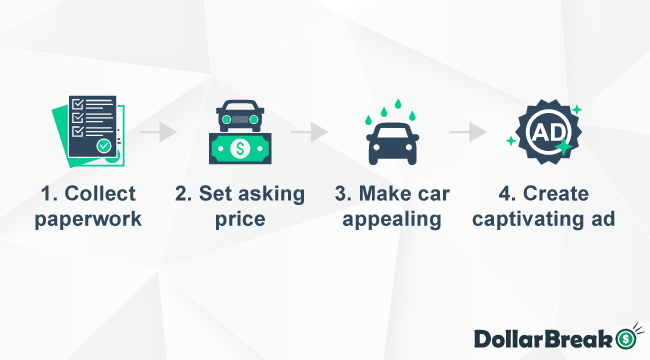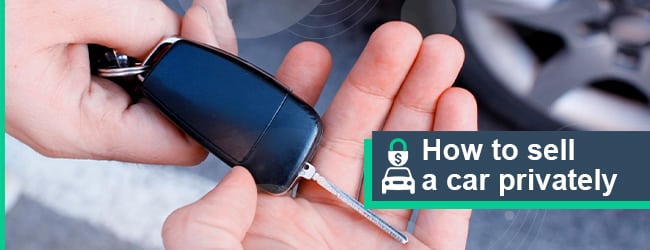Quick Answer:
To sell your car privately, first determine its market value, collect all necessary documents, and get it ready for sale.
To attract genuine buyers, consider listing your car on CarGurus. This platform stands out with its low listing fees, secure messaging system, and seller protection policies.
It’s essential to sign a bill of sale regardless of state law requirements and notify the DMV about the sale. This is important for safeguarding yourself from future liabilities.
Key Takeaways:
- Documentation: Prepare the car’s title, bill of sale, and other necessary documents. Apply for a duplicate title if missing.
- Pricing: Determine your car’s value using online valuation tools and compare it with similar listings.
- Preparation: Clean and inspect the car, addressing minor defects. Take comprehensive photos for listings.
- Sale Process: Advertise on multiple platforms, screen buyers, conduct safe test drives, and use secure payment methods. Complete the sale with a bill of sale.
Best for Older & Damaged Cars

Buys used, damaged or junk cars
Free tow and no hidden fees
Pays by ACH trasfer or check
Top Pick for Junk Cars

Free, no-obligation cash offers
Offers free paperwork service
Pays on the spot upon pick up
How to Sell a Car Privately?

If you’re thinking of selling your car, you might as well be wondering how to sell a car privately. Here are the seven steps you’ll need to check to sell your car to a private buyer.
1. Gather Required Paperwork
The paperwork needed to sell a car privately differs from state to state, but the nationwide requirement is to provide the Certificate of Title.
Additionally, depending on your location, you may need to supply a bill of sale, complete a VIN inspection, and present a current emissions test certificate.
To support your car’s value and give potential buyers confidence in its maintenance, it’s advisable to have a VIN check, compile service records, and include the owner’s manual.
If your car title is missing, fill out a “Duplicate Title Application” at your local DMV. Replacement title costs vary by state, typically $5 to $60, and it takes about 7-10 business days to receive.
2. Set Car Price
There are three ways to price a car to sell: using online car valuation websites, browsing online car listings and getting quotes from online car-buying companies.
Online Car Valuation Websites
Car valuation websites, Such as Kelley Blue Book or Edmunds, compile data from various sources such as dealership transactions, private party sales, auctions, and wholesale prices to determine a car’s market value.
For an accurate estimate, enter your car’s information, including brand, model, year of manufacture, mileage, condition, and any distinctive features.
Online Car Listings
Another way to assess your car’s value is by browsing car-selling websites, such as CarGurus or Autotrader and finding listings for vehicles that are similar to yours.
Compare these cars by their make, model, year, mileage, condition, and any unique features.
Online Car Buying Companies
Online car-buying companies like Peddle or Wheelzy offer a swift solution for selling your car. Requesting a cash offer gives you an idea of the potential quick-sale value, which you can then compare to the potential gains of selling privately to assess if the extra effort is worthwhile.
3. Prepare Your Car
Before putting your car up for sale, addressing small issues like burnt-out light bulbs and other minor defects can significantly enhance its value and attractiveness to potential buyers.
Consider having a qualified technician inspect the car. Use the resulting inspection checklist to demonstrate the car’s maintenance history to prospective buyers.
Additionally, thoroughly wash the exterior and diligently clean the interior. Implementing minor updates, such as new floor mats and air fresheners, can also influence the sale process.
Remove all personal items to improve the vehicle’s presentation and protect your personal information.
Refrain from undertaking major repairs or modifications, as these can increase your asking price and might dissuade buyers.
4. Take Photos of the Car
Photos are crucial in a car listing, so take shots from various angles and in good lighting, highlighting unique features like the grill, wheels, or navigation system.
Include images of any cosmetic flaws or body damage to enable informed decision-making by buyers.
Include images of the odometer, VIN, engine, and interior details. However, avoid displaying the license plate or personal information.
5. Advertise the Car
To maximize the exposure of your car listing, it’s advisable to advertise on multiple platforms.
Your ad should be thorough and truthful, encompassing essential details like the car’s make, model, year, mileage, overall condition, any distinctive features, and the price you’re asking.
Be open about the vehicle’s history and its upkeep, leveraging the documents and maintenance records you have.
Lastly, make sure your contact information is easily accessible and be prompt in responding to potential buyers, as this sets a constructive tone for future discussions regarding the sale.
Best platforms to sell your car privately:

6. Screen Potential Buyers
When selling your car privately, it’s crucial to safeguard against scams or unfavorable deals.
Here’s how to check potential buyers effectively:
- Request their full name and contact details: for identity verification and future communication.
- Inquire about their reason for buying the car: to assess if they’re genuinely interested or just browsing.
- Ask about their timeline for the purchase: to understand their commitment and likelihood of completing the deal.
- Understand their financing plans: if they’re using a third-party lender, obtain the lender’s details to confirm loan approval.
Be cautious of:
- Buyers prefer only email or text communication; genuine buyers typically opt for phone or in-person discussions.
- Buyers are urging a quick sale, as they may not have your best interests at heart.
- Payment methods, like wire transfers or prepaid cards, are red flags for potential scams.
7. Schedule Test Drives
Test drives are one of the most important steps in the selling car process.
To make the process smooth and secure, follow these steps:
- Plan a Test Drive Route: Before engaging with potential buyers, plan a route for test drives. Choose a public location and opt for a place with security and surveillance, like a bank’s parking lot or near a police station.
- Safety in Numbers: Bring a friend along for added safety. Schedule the test drive during the day and in a populated area to ensure visibility and safety.
- Check Credentials: Before allowing a potential buyer to drive your car, check and ask to take a photo of their driver’s license.
- Establish Clear Expectations: agree on duration, driving route, and any limitations. Communicate these expectations to the potential buyer beforehand to avoid misunderstandings.
- Accompany the Buyer: Ride along with the potential buyer during the test drive to maintain control of the vehicle and observe their driving habits. This also provides an opportunity to answer any questions they may have about the car’s features and performance.
Ensure that your car’s registration is up to date. Driving a vehicle with expired registration on public roads is illegal and could result in a fine if you are stopped by law enforcement.
8. Pre-purchase Vehicle Inspection
A pre-purchase vehicle inspection (PPI) is a critical aspect of private car sales, benefiting both buyers and sellers. It offers reassurance by confirming the vehicle’s operational state and uncovering any undisclosed issues, ensuring a transparent and trustworthy transaction.
What’s Included in a PPI:
- Detailed assessment of the exterior for any damage like dents, scratches, or signs of rust.
- Evaluation of the interior for signs of wear, potential electrical problems, or missing elements.
- Examination of the engine, transmission, and other key parts for leaks, correct fluid levels, and functionality.
- A road test to gauge the vehicle’s handling, braking efficiency, and overall driving performance.
The cost of the inspection is typically covered by the buyer. You can choose to join the buyer at a nearby garage or at a mechanic selected by them for the inspection.
9. Sign the Bill of Sale
When selling a car, a bill of sale is crucial because it documents the sale and transfer of ownership, helping finalize the transaction. It serves as proof of sale, providing key information about the vehicle and the terms of the deal.
Advantages for the seller:
- Protects from liability. The bill of sale can help to prove that the seller is no longer the owner of the car.
- Helps to avoid fraud. A bill of sale can help to prevent the buyer from claiming that they paid a different amount than what was agreed upon.
- Makes it easier to file taxes. The seller may be able to deduct the sale price of the car from their taxes using the bill of sale as proof of the sale.
Advantages for the buyer:
- Proves ownership of the car. The bill of sale is a legal document that shows that the buyer is now the legal owner of the car.
- Helps to avoid disputes with the seller. The bill of sale should outline all of the terms of the sale, including the purchase price, the condition of the car, and any other important information.
- Makes it easier to register the car. In some states, the buyer will need to present a bill of sale to the DMV in order to register the car in their name.
10. Transfer Title
Transferring the title of a vehicle when selling involves several key steps, although the specific requirements can vary slightly depending on the state.
Here is a general guide on how to transfer the title:
- Sign the Title: sign the title in dedicated areas and add odometer readings.
- Notarization (if Required): In some states, your signature as the seller may need to be notarized.
- Payment of Fees: The buyer may need to pay a title transfer fee and possibly sales taxes to the state.
- Submitting Paperwork to the DMV: After completing the title transfer documents and, if necessary, getting the signatures notarized, the buyer should submit the applicable paperwork to the DMV.
It’s recommended to check the specific local requirements with your state’s DMV before proceeding with the sale. This will ensure compliance with all local laws and regulations regarding the transfer of vehicle ownership.
11. Notify DMV
You should notify the DMV about the sold car as soon as possible, usually between 5-15 days after the Title transfer. In some states, this can be done online, while in others, you may need to mail a paper form.
Notifying DMV about the sale protects you from liability for any parking tickets, accidents or other violations that occur after the sale. Also, it will cancel your registration, preventing you from being charged registration fees and taxes for a car that you no longer own.
12. Cancel Insurance
Once you’ve finalized the sale of your car, it’s essential to handle the remaining administrative task: canceling your car insurance.
Promptly contact your insurance company to cancel your car insurance policy. Continuing to pay for insurance on a vehicle you no longer own is unnecessary and can result in financial losses.
Additionally, you may be eligible for a refund of any prepaid premiums.
Safest Payment Methods When Selling a Car Privately
Selling a car privately can be a great way to get a fair price for your vehicle, but it’s important to take precautions to protect yourself from fraud and scams.
Here are the safest payment methods when selling your car privately:
- Cashier’s Check. A cashier’s check is a guaranteed funds check issued by a bank. This means that the funds are guaranteed to be available, so you don’t have to worry about the check bouncing.
- Bank Transfer. With a bank transfer, the funds are transferred directly from the buyer’s bank account to your bank account. This means that the funds are immediately available to you.
- Cash. If you accept cash, be sure to meet the buyer in a public place and count the money carefully before you hand over the car.
Here are some additional tips for accepting payment when selling a car privately:
- Never accept a personal check. Personal checks can bounce, and it can be difficult to collect them.
- Meet the buyer in a safe place. Avoid meeting the buyer at your home or in an isolated location.
- Verify the buyer’s identity. Ask the buyer to show you their driver’s license and registration.
- Never sign the title over to the buyer until you have received payment in full.
How to Sell Financed Car Privately?
To sell a financed car privately, follow these steps:
- Check Your Payoff Amount: to get this information, you can contact your lender by phone or request it through their website.
- Find Out How Much Your Car is Worth: use platforms like Kelly Blue Book and Edmunds.
- Consider Your Car’s Equity: this refers to the difference between how much your car is worth and your payoff amount. It determines whether you can make money from the sale or otherwise.
- Talk to Your Lender About the Sale: Discuss your intention to sell with your lender and determine the equity position, the payoff process, and requirements to finalize the sale.
- Get your Buyer in the Loop: tell them your loan status and that your lender knows about the sale.
How Long Does It Take to Sell a Car Privately?
On average, selling the car to a private buyer, including steps like cleaning, photographing, pricing, listing, responding to inquiries, conducting test drives, and managing paperwork, takes around 52 days.
In contrast, selling to a local dealership is typically completed in about 4 to 5 days and selling to online car buying services such as Peddle, Wheelzy, or Carbrain, where the process can be completed in as little as 48 hours.
Do You Pay Taxes When Selling Car Privately?
The buyer, not the seller, is responsible for paying the sales tax.
However, the seller is responsible for paying a capital gain tax if the car is sold for more than its purchase price. If sold for less, no tax is due to the IRS.

How do You Sell a Car Out of State?
The key difference when selling a car to an out-of-state buyer compared to an in-state sale is in the documentation. You must ensure that you comply with the paperwork requirements of both your state and the buyer’s state.
For instance, selling a car in Arkansas doesn’t require an emissions test, but if the buyer is from California, this document becomes necessary.
Can you Sell a Car Without a Title?
In every state, it’s illegal to sell a car without a Title. If you’re missing the document, you must apply for a duplicate Title.
However, some states allow exceptions for older vehicles, accepting a Bill of Sale in place of the Title.








